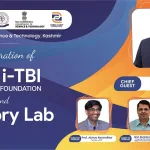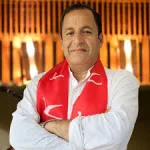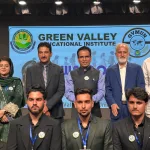PART-1
NAZIR AHMAD GANAI / PARVAZE A SOFI
India towards knowledge superpower
India is now recognised as a key player in global geopolitical engagements. India’s rise as a strong nation has been a result of a strong political dispensation aiming to steer the country of 1.4 billion people into the league of elite nations, driven by the ethos of Unity in Diversity and strong national commitment to rise as a Vishwa Guru. As a nation with one of the largest young populations (~28%) and a country tipped to be the youngest population by 2030, India is contemplating empowering them as skilled and knowledgeable changemakers. Globally the demand for higher education is expected to grow exponentially from 100 million students currently to more than 250 million by 2025. This growth will be particularly driven by countries like India. Much of India’s progress in recent years has been driven by outstanding human resource output in and outside the country. India’s performance in key sectors such as agriculture, health, IT, space, manufacturing and service sector has been commendable, helping it become the World’s 3rd Largest Economy. Despite improving its performance across all indicators by 15.74% between 2010-2018, India still lags in Global Youth Development Index at 133rd rank, disproportionate to its techno-political standing in the world, attributed to the disproportionate flexibility and autonomy in multiple tiers of the education system.
India’s aspiration as Vishwa Guru
India’s aspirations to be the Knowledge Superpower and a $10 trillion economy, lies in its Knowledge economydriven by eco-system of innovations. It demands a paradigm shift in our policy – improving of our ranking in spending on education from 144 to 50, and giving flexibility and autonomy to universities and colleges to innovate for the perceived Knowledge economy.
During the last 20 years, India has remarkably transformed its higher education landscape through widespread access to low-cost, high-quality university education at all levels resulting in better enrolment numbers and enhanced learning outcomes. A strong and autonomous university system has enabled India to resolve the longstanding tension between excellence and equity. This, coupled with large-scale reforms, has given India a 70 million strong student population as a force to reckon with, comprising potential thought leaders, changemakers, researchers and academicians, and entrepreneurs positioned at the helm of knowledge creation, and driving the engine of its US$ 3 trillion economy.
Paradox of Development
While India takes pride in having largest youth population, the largest educational system and is emerging as the fastest growing economy and the startup nation of the world, yet 133rd rank in Global Youth Development Index and fewer than 25 universities in top 200 universities, figures towards something really lacking.
Why India needs to act
Despite these strides of progress, India’s higher education institutions are not yet the best in the world. Less than 25 universities figuring among the top 200 best institutions is paradoxical to the fact that India’s post-secondary education system is recognised as one of the best in the world. This bizarre disproportionation has led the national policy planning think tanks to reassess the country’s position vis-à-vis its future directions for education to act as a tool for national development. India’s policy dispensation has set ambitious targets for development indicators to march from a $ 5 trillion economy to $ 10 trillion by 2030, with much of India’s progress expected from knowledge-driven economic progress. India aims to be the Knowledge Superpower, and Shrestha Bharat, through a system of education that transforms today’s youth into tomorrow’s innovators, creators, nation builders, leaders and change makers. It is with this pursuit that India brought a new education policy (NEP-2020) 36 years after the last policy was enacted with an aim to help India to take a quantum lead in the next century through a highly competitive and flexible science education system that will be driven by innovation, discovery and knowledge and has a visible impact in discovery landscape of the world. Such systems, practised in the West, characterised by flexibility and autonomy in thought process, ideation and execution in all domains of their activity such as governance, recruitment, human resource management as well as perspective policy planning for developing short and long-term roadmaps encompassing all the hierarchies of the education system from K12 to the university system resulting in coherent progress at all levels. The policy aimed at creating a flexible education system that helps India create knowledge leaders, that can help the country solve the contemporary challenges and adapt and absorb new material in novel and changing fields, such as the rise of big data, machine learning, and artificial intelligence. The policy aims at creating a globally competitive system of education driven by innovation, discovery and technology development that will help India not only improve its human resource output but also capture the global technology and services market. The policy leverages substantial flexibility and autonomy to institutions encompassing K12 to university education to realign themselves to target.
NEP-2020: India’s resolve towards transformative education
India enacted a new education policy in 2020 to remove the bottlenecks that have precluded India from harnessing the power of the largest youth population by infusing revolutionary ideas that favour greater flexibility and choice to students towards promoting access and equity as well as promoting institutional autonomy to bring innovative reforms. The policy aims at improving the skill sets, leadership attributes and poise next-gen students for propelling India towards an economic and intellectual power to reckon with.
For the new system of education to deliver social and economic impact, as well as intellectual value it is imperative to have access, equity and qualityin the process of human capital development and accomplish the broader goals country has set for 2030 and beyond. There is a need for an education system that is transformative and innovative across all thelevers of higher education: from curricula and pedagogy to the use of technology to partnerships, governance, recruitment and funding. This is especially important in view of new drivers of action such as globalization, Intellectual property rights, new frontiers such as AI, ML, Big Data analysis, Biotechnology, nanotechnology, Sensors, Communication revolutions etc. Our new crop of educated youth needs to be skilled and empowered to handle new challenges posed by a globalized environment with a focus on national development.
Towards reformed agricultural education: ICAR vision and SKUAST-K initiatives
Agriculture is a key player in national development and is one of the resilient sectors of the economy as demonstrated during the Covid-19 pandemic. However, the sector faces many challenges such as (i) Below average productivity (to 60% of the worldaverage), (ii) Declining profitability (iii) rising competitiveness under globalisation, (iv) poor farm-to-marketlinkages, (v) Subsistence scale (vi) Huge research impact gaps, (vii) low level of mechanization andlack of value addition (viii) Sub-optimal Supply Chain Management, (ix) Greater challenges to sustainabilitydue to natural resources depletion, biotic andabiotic stresses. In order to create a competent human resource that can help the nation address new and emerging challenges and help sustain our leadership in key areas of agriculture, India needs to realign its agricultural higher education towards greater responsiveness and build a strong and resilient agriculture sector that not only helps India to fulfil its domestic food, nutrition and livelihood security commitments but also gain leadership position in these strategic sectors.
India has developed one of the finest models based on the land grant pattern ofthe USA with substantial autonomyforthe system to operate. India has one of the largest human resources in agriculture research and education in form of ICAR and its institutions as well as state agricultural universities that are catering to national as well as regional human resource and technology requirements of the country. With such a system, India has been able to give to this world some of the finest science leaders in agricultural research that have shaped modern research platforms across the globe. The system has helped India progress from just 50 million tonnes in 1950 to more than 300 million tonnes in 2022. A similar system has been allowed to flourish at state levels and SKUAST-K is the best demonstration of such an autonomous university research and education system that has helped the state in fulfilling its commitments to human resource development and improving food and nutritional security imperatives.
Well before NEP-2020, ICAR had envisioned a need to transform the Indian agricultural education system and heralded a holistic and far-reaching national initiative of NAHEP funded by the World Bank to realign the higher education in agriculture to global standards, leveraging greater freedom for reforms, innovative policy frameworks and sought to develop all the pillars including faculty, students, matching infrastructure as well as policy and governance freedom. SKUAST-K also earned the honour of being a proud partner in this national initiative through competitive pitching of its vision for a holistic education system that is led by innovation, discovery, technology developmentand entrepreneurship development by creating a learning environment that is inclusive, stimulating with a wide range of learning experiences and supported by most modern physical infrastructure and human resource, with a freedom to access, assess, adapt and apply knowledge to think independently so as to develop a sense of appropriate judgement and collaboration.
SKUAST-KModel: A symbol of growth driven by disruptive thinking
SKUAST-Kashmir under the ambit of ICAR-World Bank funded NAHEP has been an outstanding example of institutional progress driven by disruptive thinking in all spheres of activity. The policy and action framework developed by SKUAST-K has been recognised at the national level as a model to emulate. The model is perfectly aligned to NEP-2020 as well as rallies over the futuristic educational model that is flexible, autonomous, tech-driven and embraces new frontiers of science & technology as drivers of future growth in agriculture. The vision and action framework proposed by SKUAST-K for an outcome-based education was appreciated by US experts and in recognition of the innovative and futuristic model for overhauling Agri education in India. ICAR leveraged the onus of developing a working model of the stated innovations that can be replicated across the country. SKUAST-K drew parallelism in its proposed model with NEP-2020 and used the flexibility and institutional will to develop a working model that was driven by the mantra of creating a globally competitive and socially responsible human resource that embraces the spirit of creativity, innovation, discovery and leadership to become change makers and contribute towards the broader national goal of becoming a Knowledge Superpower.
The model of agricultural education of SKUAST-K has four major levers viz., Excellenteducation through outstanding teaching and learning driven by pedagogical innovation, flexibility and choice for students, Impactful Research that drives innovation and discovery for science-based solutions, Leadership and management skills to ideate, prioritise, strategize, and execute educational and research imperatives of state, and Building Professional Practice and competence. The model is expected to build and operate upon greater flexibility, choice and freedom to create institutional mechanisms for such manoeuvres. Setting bigger goals and larger developmental targets requires outstanding human resource support and as such requires matching freedom and flexibility in the recruitment process where the focus is on suitability rather than eligibility and skill rather than qualification. The changes system seek to embrace new normal learning from global leadership in education and research from some of the best institutions across the world.
(To be Continued…)
(Prof Nazir Ahmad Ganai is Vice Chancellor
of SKUAST-K and Prof Parvaze Ahmad Sofi teaches plant breeding at FoA, SKUAST-K





